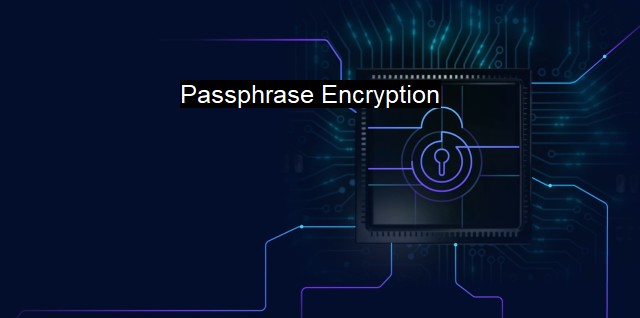What is Passphrase Encryption?
Passphrase Encryption: Ensuring Cybersecurity in Interchanged Information for Evolving Cyber-Systems
Passphrase encryption is one of the most integral aspects of cybersecurity, providing a much-needed shield against those who might want to exploit valuable and sensitive information. A passphrase is just like a password but longer and more complex, used to unlock encrypted information.A strong, well-chosen passphrase adds an additional layer of user-friendly, robust security to systems and networks that cyber adversaries often find challenging to bypass. Comprising multiple words or a short sentence, passphrases are significantly harder to crack than traditional passwords, making them an ideal encryption method in the realm of cybersecurity.
In the age of growing digital vulnerabilities and increasingly tech-savvy cybercriminals, using traditional passwords are no longer amply protective. They are generally simpler, shorter, and thus easier to break with brute-force attacks. Traditional passwords often lack entropy – a term used in cybersecurity context to measure unpredictable and random characteristics of data. Contrarily, passphrase encryption utilizes higher entropy, symbolizing a greater level of complexity and randomness that resists brute-force and dictionary-based cracking attempts.
To understand passphrase encryption, one must comprehend plain text's transformation into ciphertext via encryption. When an authorized user inputs their passphrase, the original plaintext data is rendered into an unreadable format, i.e., the ciphertext. Unless intercepted with the correct passphrase, this encrypted data remains undecipherable and securely protected. Subsequent deployment of the digitized encryption key, derived from the passphrase, deciphers and transforms this encrypted data back into plaintext for permitted users.
Passphrase encryption is used in many cybersecurity aspects, from hard drive and entire disk encryption to securing email communications, Virtual Private Networks (VPN), and antivirus protection. Passphrases are favored in securing root and administrator user access in organizations that deploy complex cybersecurity measures against potential breaches.
The adoption of passphrase encryption can also be correlated to the flourishing of Secure Shell (SSH) keys and Pretty Good Privacy (PGP) in cybersecurity. Both technological concepts employ passphrase encryption to ensure the secure transition and receipt of encrypted data, thereby securing digital communications against cyber threats.
Antivirus software also takes advantage of passphrase encryption, often providing the user with an encrypted connection for updates or additional downloads. many antivirus programs use a one-way encryption method called hashing to convert the user's passphrase into a unique, fixed-length set of characters. The hashing algorithms ensure that even an infinitesimal change in the passphrase leads to a drastically different hash, foiling cybercriminals' attempts to guess or reverse-engineer the passphrases.
Creating a strong yet memorable passphrase is not excessively cumbersome. The most effective passphrases leverage the use of unrelated words or use phrases that aren't common sayings. Length, complexity, and unpredictability are essential to resist cyber attacks.
Passphrase encryption, as illustrated, is an essential cybersecurity tool, providing fortified, user-convenient data and network protection from malicious attacks. As cyber threats persist in their advancement, so does the need for more robust defenses such as passphrase encryption. This technique increases the uphill battle for cyber adversaries while enabling individuals and corporations to retain control over their digital domain easier and safer. By coupling passphrase encryption with robust antivirus measures, a maximized defense against malicious threats can be achieved.

Passphrase Encryption FAQs
What is passphrase encryption and how does it protect my device against cybersecurity threats?
Passphrase encryption is a security measure used to protect sensitive data on your device by creating a strong password or phrase that only you know. This prevents unauthorized access to your device and keeps your personal information safe from cybercriminals, viruses, and malware.How is passphrase encryption different from traditional passwords?
Passphrase encryption uses a longer and more complex set of characters, making it harder to crack compared to traditional passwords. Passphrases typically consist of multiple words, numbers, and special characters, whereas traditional passwords tend to be shorter and more easily guessed.Is passphrase encryption necessary for antivirus protection?
While passphrase encryption is not a direct antivirus protection measure, it does add an extra layer of security to your device. Antivirus software can help detect and remove threats, but using a strong passphrase can prevent cybercriminals from accessing your data in the first place.What are some best practices for creating a strong passphrase for encryption?
To create a strong passphrase for encryption, use a combination of upper and lowercase letters, numbers, and special characters. Avoid using easily guessable information, such as your name or birthdate, and aim for a length of at least 12 characters. You can also use a passphrase generator tool to create a random and secure passphrase.| | A | | | B | | | C | | | D | | | E | | | F | | | G | | | H | | | I | | | J | | | K | | | L | | | M | |
| | N | | | O | | | P | | | Q | | | R | | | S | | | T | | | U | | | V | | | W | | | X | | | Y | | | Z | |
| | 1 | | | 2 | | | 3 | | | 4 | | | 7 | | | 8 | | |||||||